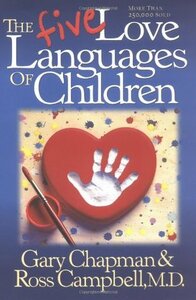You need to sign in or sign up before continuing.
Take a photo of a barcode or cover
I did not finish this book as I had a tough time with the writing style and with the religious undertones that are not clearly stated upon starting the book. The book seems to be mostly the same as the original book with the stories swapped out for parents/kids. This doesn't surprise me but having just read the original, this book was not adding any information I didn't already know/learn and not even as much information as the original.
As for the standalone book itself, I had a hard time with the fact that it's not obvious that it has religious undertones and some of the statements made came off sexist and stereotypical. It makes some assumptions that the child in question is neurotypical and that no other things may be going on. It also was unhelpful in that it's written more in a style for an older child closer to their teen years than it does for younger children, even though there's a separate teen book. It does provide some basic overviews of the love languages with some anecdotes and examples of how to show that love language to children so in the most basic sense, it does fulfill what they set the expectation to be.
In the end, I did take away a few nuggets from the book that might prove helpful but the nuggets I may find moving forward weren't worth trying to muddle through the book for me.
As for the standalone book itself, I had a hard time with the fact that it's not obvious that it has religious undertones and some of the statements made came off sexist and stereotypical. It makes some assumptions that the child in question is neurotypical and that no other things may be going on. It also was unhelpful in that it's written more in a style for an older child closer to their teen years than it does for younger children, even though there's a separate teen book. It does provide some basic overviews of the love languages with some anecdotes and examples of how to show that love language to children so in the most basic sense, it does fulfill what they set the expectation to be.
In the end, I did take away a few nuggets from the book that might prove helpful but the nuggets I may find moving forward weren't worth trying to muddle through the book for me.
I was already familiar with the 5 love languages before reading this book, but having it explained in the context of kids was nice. There were some really great ideas that I can apply in my parenting immediately. Some of the advice was overly gendered in a really reductive way (boys are this way, girls are this way, etc.), which is the main reason I lowered its rating.
I don't feel that I learned much more from this that I didn't get from the original ([b:The 5 Love Languages: The Secret to Love that Lasts|23878688|The 5 Love Languages The Secret to Love that Lasts|Gary Chapman|https://i.gr-assets.com/images/S/compressed.photo.goodreads.com/books/1432487272l/23878688._SY75_.jpg|832090]). That said, there are some fairly good examples of ways to figure out a child's love language and how to express it in a way they'll appreciate.
But, not that I'm an expert on child development, some of the generalizations about kids and their desires just didn't seem right — and while I agree that it's important to make children (and teens) feel loved even when they're being difficult, it was uncomfortable to see parents and guardians being told to borderline force physical affection. (How are you going to teach them the importance of consent if you don't respect it?) I was also quite put off by the pervasive heteronormativity/gender roles and excessive Christian preaching.
But, not that I'm an expert on child development, some of the generalizations about kids and their desires just didn't seem right — and while I agree that it's important to make children (and teens) feel loved even when they're being difficult, it was uncomfortable to see parents and guardians being told to borderline force physical affection. (How are you going to teach them the importance of consent if you don't respect it?) I was also quite put off by the pervasive heteronormativity/gender roles and excessive Christian preaching.
in general, I liked it. It was a tad heavy-handed on mentioning Christianity, but not off-putting. There were several points I was able to take away from and knowing about the "5 languages' is helpful. now I can observe my daughter and see which one she leans towards and related to get a little better.
informative
reflective
slow-paced
Great practical info for kids but the examples sometimes were a little too cliche and obviously over dramatized or emphasized for affect.
I like the content of this book, but felt like it could have been an article, not a whole book. I also felt like I kind of lost interest once I realized what each of my kid’s love languages are (but those chapters were helpful!)
After reading The 5 love languages, I was curious about The 5 Love Languages of Children. To be honest I don’t really read any self-help and personal growth types of books, but as a parent of 2 small children I was curious about this specific book. Having read the 5 love languages first made me appreciate and understand the perspectives in this book more. It’s basically the same concept but applying it to your children. It focuses on the way they learn about love and how they express and demonstrate that love. While I understand this book won’t be for everyone I would highly recommend it to parents, especially if you ever feel like you are struggling to understand your child or the way they are behaving or why. One of the things I have found the most difficult about being a parent is that no one really talks about how hard and lonely of a journey it can be, yes it’s one of the most rewarding things I’ve ever done but also the most difficult. This book helped me realize some things and think about specific experiences in a new way. I think that’s why I appreciate it and would encourage other parents to read it too.
Read this for an instructor class as it was going to be discussed.
It was ok. Some of the ‘stories that happened’ felt made up to fit the section of the book. There were some parts that were unnecessarily related to god or religion. Overall it had some thought provoking ideas but is not the end-all-be-all to understanding your child as it is made out to be
It was ok. Some of the ‘stories that happened’ felt made up to fit the section of the book. There were some parts that were unnecessarily related to god or religion. Overall it had some thought provoking ideas but is not the end-all-be-all to understanding your child as it is made out to be
Hmm. This was a pretty good book, but it seemed a little phony in parts. The imagined dialogues were absurdly simple. The discussion of single parenting was lacking. In a way, I think the whole book was pretty simplistic, but...
I got something out of it, and that makes it worth reading. Regardless of whether you ascertain anyone's particular "love language," I think the idea of expressing your love for others in more than one way is pretty important. I appreciated the examples because they offered a starting point (who "hems skirts" anymore?!).
This book is sort of a riff on Goleman's intelligences. I have definitely noticed that when I make a conscious effort to reach out to people I love in these different ways, they respond. Maybe just breaking the monotony of how I usually let them know I care makes them stop and take notice. I don't know. But it seems to me that encouraging kindness through loving contact, words, focused time, acts of care and even gifts, can only strengthen connections to the people we love. The book was a nice reminder and a good impetus to think outside of my routine zone.
I got something out of it, and that makes it worth reading. Regardless of whether you ascertain anyone's particular "love language," I think the idea of expressing your love for others in more than one way is pretty important. I appreciated the examples because they offered a starting point (who "hems skirts" anymore?!).
This book is sort of a riff on Goleman's intelligences. I have definitely noticed that when I make a conscious effort to reach out to people I love in these different ways, they respond. Maybe just breaking the monotony of how I usually let them know I care makes them stop and take notice. I don't know. But it seems to me that encouraging kindness through loving contact, words, focused time, acts of care and even gifts, can only strengthen connections to the people we love. The book was a nice reminder and a good impetus to think outside of my routine zone.






